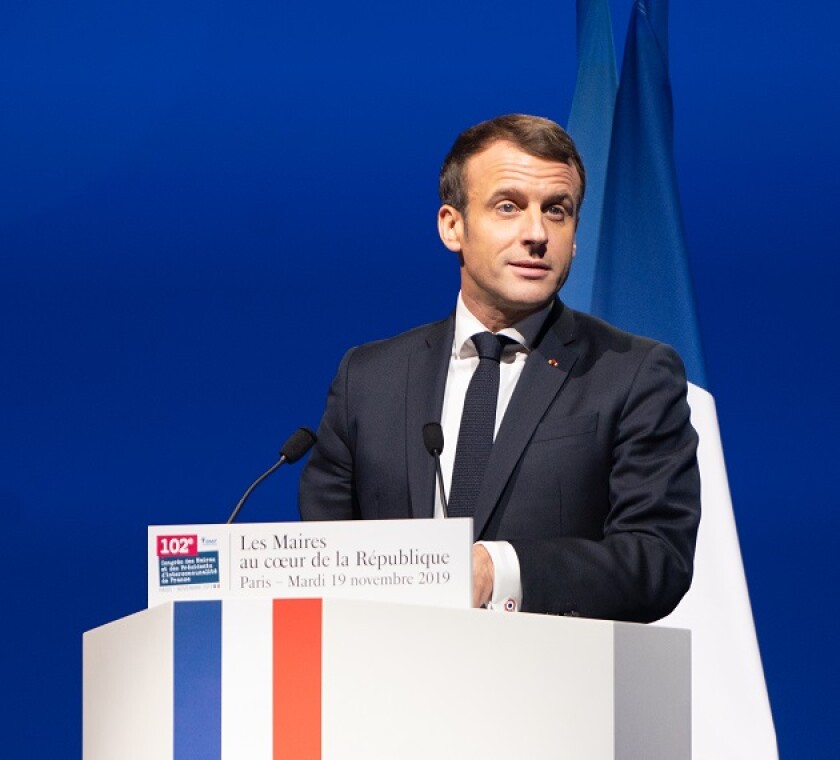Facing a close race for a second term, Macron has pledged to abolish the contribution on added value (CVAE) to save French businesses an estimated €7 billion ($7.7 billion) a year. He has based his economic plan around pledges to cut taxes and reduce unemployment at the same time.
“If President Macron wants the tax cut to primarily benefit corporate taxpayers with high investments and material employee expenses, abolishing CVAE makes more sense than reducing corporate tax,” said Maxime Amar, director of M&A and international tax at KPMG Advocats.
By contrast, a reduction of the corporate tax rate would benefit all profit-making companies regardless of their investments and workforce. Corporate tax was one of the key promises of Macron’s 2017 campaign, but this time it is the CVAE.
The CVAE is levied on business turnover, employees and property rather than profit. This value-added levy applies to businesses with a turnover of more than €500,000 and rises up to 1.5% from €50 million in turnover.
Although the CVAE rate is just 1.5%, the end of the CVAE may be a significant tax cut for many French businesses because it is paid on top of corporate tax. He has already managed to cut the corporate tax rate from 33% to 25% over five years.
However, the impact will be different depending on the company. “Neither the remuneration paid to employees, nor depreciations, i.e. cost of investment, are deductible for CVAE purposes, whereas they are deductible for corporate tax purposes,” said Amar.
“The corporate tax impact of the abolishment of the CVAE will have to be anticipated – indeed, since CVAE is deductible for corporate tax purposes, the abolishment of CVAE will mechanically lead to an increase of the tax result for the concerned taxpayers,” he explained.
In total, Macron has pledged €15 billion in tax cuts with half of those targeted at individuals, including the end of the TV license fee. This is despite the government spending €22 billion on helping individuals and companies with energy costs.
Indirect tax has taken precedent over corporate tax in this election campaign. All of the candidates have focused on personal and indirect taxation due to the rising cost of living.
What’s the alternative with Le Pen?
The election looks like it will be a re-run of the 2017 election, where Macron and far-right candidate Marine Le Pen made it to the final round. In the end, Macron defeated Le Pen by 66.1% to 33.9%. Polls suggest that this election will be much closer. The Harris Interactive poll found Macron may win a narrow victory over Le Pen – 51.5% to 48.4%.
Le Pen has worked hard to ‘detoxify’ her party, National Rally, ahead of the election. She has distanced herself from her party’s past and she has focused her fiscal policy on individual and consumption tax. Le Pen has pledged to cut VAT on all energy products from 20% to 5.5%.
The 15.5% VAT cut would cost the French government an estimated €12 billion in revenue. However, the promise of much lower energy costs comes at a time when Europe is facing higher fuel costs because of the Russia-Ukraine war.
Le Pen wants to exempt all workers up to the age of 30 from income tax and abolish inheritance tax for lower-income and middle-class families. The income tax exemption would be another significant blow to state finances, but it is popular.
“Against our expectations, Le Pen has been able to avoid criticism on her past links with Russia, focusing her messaging on the rising cost of living with popular but unrealistic measures such as eliminating income tax for the under-30s,” said Antonio Barosso, deputy director of research at Teneo.
Le Pen has neglected corporate tax policy despite a record of favouring higher corporate rates for foreign companies. She has instead promised tax breaks for businesses that give their employees a pay increase.
Spending cuts
The French government is expected to make spending cuts if Macron wins a second term, while Le Pen may be more likely to flout EU spending rules.
“With her agenda of protectionism, reform rollbacks, subsidies and harsh measures against immigration, she would likely trigger many conflicts with the EU,” said Kallum Pickering, senior economist at Berenberg.
“The European Commission may then take France to the European Court of Justice for violating EU rules in many cases,” said Pickering.
Since the COVID-19 pandemic began, France has taken tough measures to contain the virus while resorting to emergency spending to support the economy. Macron still hopes to “balance the books” despite the surge in public spending.
The EU is expected to suspend its fiscal rule due to the Russia-Ukraine war, but Macron is still keeping the 3% target as part of his plans for a second term. The aim is still to get the budget deficit in line with the EU limit of 3% of GDP by 2027 – a decade after he first made this pledge.
Macron has succeeded in changing the tax agenda in France. Not only did Macron cut corporate tax to 25%, he set a flat rate of 30% on income from interest, dividends and capital gains. He also converted the solidarity tax on wealth (ISF) into a property tax.
The French government imposed a digital services tax (DST) as leverage to secure an OECD-brokered agreement on the digital economy. France is set to implement the global minimum corporate rate. These achievements will last for years to come regardless of the outcome of the election.
If he wins a second term, Macron will be the first French president to do so for 20 years. The first round of voting will take place on April 10, followed by the final round on April 24. Macron won a strong majority in 2017, but a win is not guaranteed this time.











